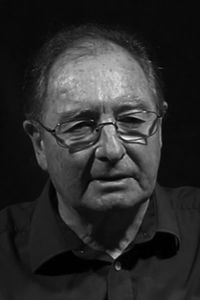David Maloney was a renowned director of television drama who became closely associated with the BBC's science-fiction output, directing many episodes of Doctor Who (1963) and producing Blake's 7 (1978) and The Day of the Triffids (1981).
An evacuee during the Second World War, Maloney was educated at Blue Coat school and King Edward VI grammar school. After leaving school, he became a journalist on the Birmingham Evening Despatch and later trained at the Birmingham Theatre School.
Maloney joined the West of England Theatre Company and further repertory followed in Oldham, Sheffield, and Chesterfield. By the 1960s, television was replacing theatre as popular entertainment, and Maloney made the transition, leaving acting behind him to join the BBC as a production assistant.
Gaining experience supporting directors such as Douglas Camfield, Christopher Barry, Michael Leeston-Smith, and Michael Imison on the early series of Doctor Who (1963),Maloney took the BBC directors course and his first major assignment was The Mind Robber: Episode 1 (1968),a very demanding project with no budget.
Impressed by Maloney's skill, he was brought back to direct two more serials for that season, The Krotons: Episode One (1968) and The War Games: Episode One (1969). Maloney directed one Doctor Who (1963) serial for the next production team, Barry Letts and Terrance Dicks, which was the six-parter Planet of the Daleks: Episode One (1973),starring Jon Pertwee.
During the early 1970s, Maloney was occupied with directing classic serials for the BBC, including Ivanhoe (1970) and The Last of the Mohicans (1971). In 1974, a new production team took over Doctor Who (1963),Philip Hinchcliffe and Robert Holmes, and Maloney became the perfect choice to return to the series to direct the forthcoming Genesis of the Daleks: Part One (1975).
Maloney developed a good working relationship with the series' new star, Tom Baker, and became an automatic choice to return for the next season's Planet of Evil: Part One (1975). His next serial, The Deadly Assassin: Part One (1976),became one of the most controversial serials in the programme's history.
Maloney's final assignment for Doctor Who (1963) was The Talons of Weng-Chiang: Part One (1977),which was also Philip Hinchcliffe's final serial as producer. Maloney had directed four serials for the Hinchcliffe era, more than any other director.
Maloney was promoted to become producer of the new science-fiction series, Blake's 7 (1978),written by Doctor Who (1963) veteran Terry Nation. Blake's 7 (1978) was an immediate hit, despite some unfavourable comparisons with the expensive Hollywood blockbuster Star Wars: Episode IV - A New Hope (1977).
After three successful series of Blake's 7 (1978),Maloney left the series, and the fourth and final series was put in the care of one of Maloney's regular directors, Vere Lorrimer. Maloney stayed with the BBC to produce the fourth and final series of When the Boat Comes In (1976) and then returned to science-fiction again, producing The Day of the Triffids (1981).
After several years as a staff producer for the BBC, Maloney returned to directing on series such as Juliet Bravo (1980) and Play for Today (1970). With Maelstrom (1985),Maloney reunited with Vere Lorrimer, only this time Maloney was directing while Lorrimer was producing.
His final years in television found him leaving his long association with the BBC and directing documentaries for Central Television. After retiring from television, Maloney kept himself busy in his later years, remaining in demand to give interviews and public appearances in connection with Doctor Who (1963) and Blake's 7 (1978).
Following his death in 2006, tributes flooded in from his Blake's 7 (1978) colleagues, including Gareth Thomas, Sally Knyvette, Paul Darrow, Michael Keating, Stephen Greif, and Michael E. Briant.























